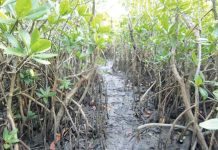
NEW evidence has emerged of a link between human exploitation of nature and pandemics.
Close contact with wild animals through hunting, trade or habitat loss puts the world at increased risk of outbreaks of new diseases, said scientists.
Coronavirus is thought to have originated in bats, with other wild animals, possibly pangolins, playing a role in transmission to humans.
There are strong indications of a wildlife source and a link to trade.
In the latest study, researchers trawled scientific papers for reports of diseases that have crossed from animals to humans, then combined this data with information on extinction risk compiled by the International Union for the Conservation of Nature (IUCN).
Wild animals at risk of extinction due to human exploitation were found to carry over twice as many viruses that can cause human disease as threatened species listed for other reasons. The same was true for threatened species at risk due to loss of habitat.
“As natural habitat is diminished, wildlife come into closer contact with people,” Christine Johnson of the University of California, Davis, US, told BBC News.
“Wildlife also shift their distributions to accommodate anthropogenic activities and modification of the natural landscape. This has hastened disease emergence from wildlife, which put us at risk of pandemics because we are all globally connected through travel and trade.”
Wild animals on the edge of extinction are few in number and generally pose a
low risk of passing on infectious diseases, Johnson said, except where human
exploitation and habitat loss puts them in close contact with humans.
“Exploitation of wildlife, which has caused once abundant wildlife to decline in numbers, through hunting and trading in wildlife, have endangered species survival and also put humans at risk of emerging infectious disease,” she said.
Scientists have long drawn attention to human diseases that have originated in animals, including SARS, MERS and Ebola. In the wake of coronavirus, there is growing awareness that human health is linked both with animal health and the health of the planet as a whole.
A wide range of organizations are calling for curbs on wild animal trade to reduce risks to human health. Johnson said wild animals sold in busy markets where animals and people mix present an opportunity for diseases to jump between species that would normally never come together in the natural world.
“Disease emergence that occurs anywhere can affect us all and we need to all understand the impact we are having when we interact with wildlife, realize that disease emergence is an environmental issue, and find more sustainable ways to co-exist.”
The research is published in the journal Royal Society Proceedings B.(BBC)



